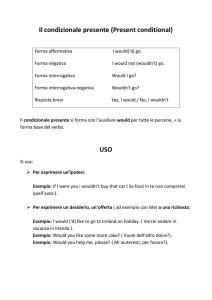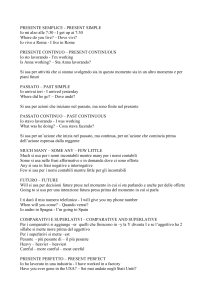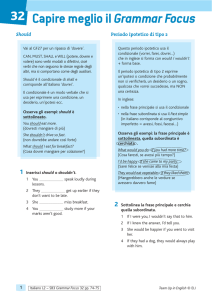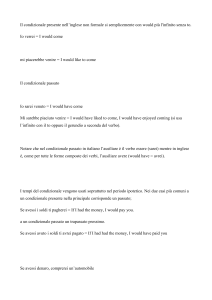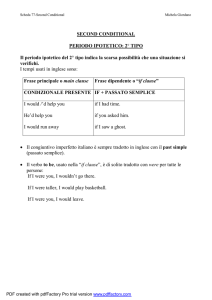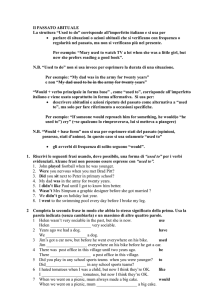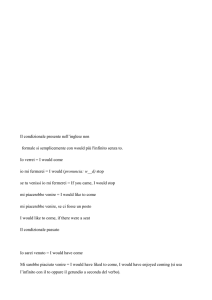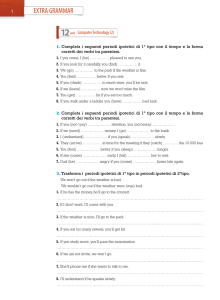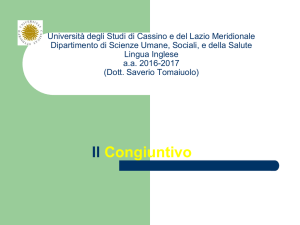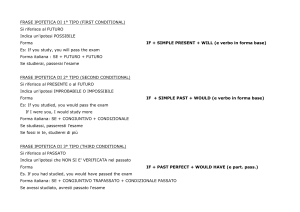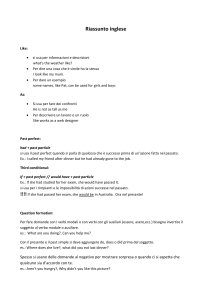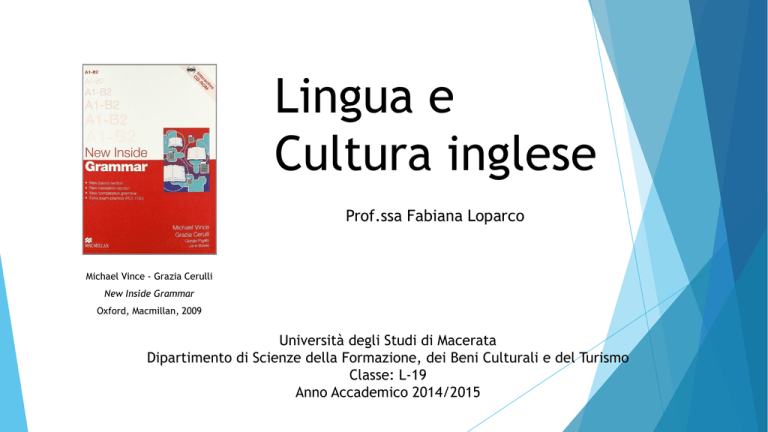
Lingua e
Cultura inglese
Prof.ssa Fabiana Loparco
Michael Vince - Grazia Cerulli
New Inside Grammar
Oxford, Macmillan, 2009
Università degli Studi di Macerata
Dipartimento di Scienze della Formazione, dei Beni Culturali e del Turismo
Classe: L-19
Anno Accademico 2014/2015
Lesson number: 10
1. Il condizionale (The conditional)
2. Il periodo ipotetico
3. Unless, as soon as, before…
1. Il condizionale (The conditional)
Il condizionale presente si forma con would + forma base del verbo
Forma affermativa
Forma interrogativa
Forma negativa
I would/I’d go
Would I go?
I wouldn’t go
You would/You’d go
Would you go?
You wouldn’t go
He/she/it would/’d go
Would he/she/it go?
He/she/it wouldn’t go
We would/’d go
Would we go?
We wouldn’t go
You would/’d go
Would you go?
You wouldn’t go
They would/’d go
Would they go?
They wouldn’t go
Nota: La forma negativa della forma breve, cioè quando si contrae il verbo con il not, possiamo
utilizzarla sempre (qualsiasi sia la parola che precede).
She wouldn’t ask
Mrs Sanders wouldn’t ask
Possiamo utilizzare tutte le altre forme brevi soltanto dopo i pronomi e non dopo altri tipi di parole.
She’d not ask
non
Mrs Sanders’d not ask
Il condizionale passato si forma con would + have nella forma base + participio passato. Nei verbi
regolari il Past Participle si forma con l'aggiunta finale di ed. Nei verbi irregolari utilizziamo la 3. forma
del verbo (terza colonna della tabella dei verbi irregolari)
Forma affermativa
Forma interrogativa
Forma negativa
I would have gone
Would I have gone?
I wouldn’t have gone
You would have gone
Would you have gone?
You wouldn’t have gone
He/she/it would have gone
Would he/she/it have gone?
He/she/it wouldn’t have gone
We would have gone
Would we have gone?
We wouldn’t have gone
You would have gone
Would you have gone?
You wouldn’t have gone
They would have gone
Would they have gone?
They wouldn’t have gone
Il condizionale passato di could, should, might è dato dalle forme could have, should have, might have +
participio passato
They shouldn’t have eaten the mushrooms
It could/might have been dangerous
Exercises
Inserisci il verbo al Condizionale presente.
• If I had time, I (go) ________________________ to the cinema with you.
• If we had more money, we (buy) ________________________ a brand new TV.
• If we were on school holidays, I (have/not) ________________________ to study
now.
• If you were clever, you (do/not) ________________________ this.
• If she had a cold, she (sing/not) ________________________.
Exercises
Inserisci il verbo al Condizionale presente.
• If I had time, I would go to the cinema with you.
• If we had more money, we would buy a brand new TV.
• If we were on school holidays, I wouldn’t have to study now.
• If you were clever, you wouldn’t do this.
• If she had a cold, she wouldn’t sing.
Exercises
Inserisci il verbo al Condizionale passato.
• If you had read the book, you (pass) ______________________ the test.
• If I had had more time, I (walk) ______________________ to the station.
• If we had got up earlier, we (miss/not) ______________________ the bus.
• He (do/not) ______________________ that.
• She (win/not) ______________________ the competition if she had not trained
so hard for it.
Exercises
Inserisci il verbo al Condizionale passato.
• If you had read the book, you would have passed the test.
• If I had had more time, I would have walked to the station.
• If we had got up earlier, we wouldn’t have missed the bus.
• He wouldn’t have done that.
• She wouldn’t have won the competition if she had not trained so hard for it.
2. Il periodo ipotetico/Conditional sentences
Le frasi con if (dette anche: Conditional Sentences, If Clauses) servono per costruire il periodo ipotetico
in inglese. Ciò vuol dire che l'azione della frase principale (senza if) si svolgerà soltanto se la condizione
menzionata nella frase con if viene/sarà soddisfatta.
Esistono quattro tipi di periodo ipotetico che esprimono diversi gradi di realtà:
Secondaria
Principale
(tra la secondaria e la principale
c’è sempre una virgola)
0 realtà sempre presenti
if + presente,
presente
If whales can’t come to the surface and breath air, they die
1 Ipotesi reali o probabili
if + presente,
futuro
If you pass the exam, I’ll give you a nice present
2 Ipotesi irreali o poco probabili
if + passato,
condizionale presente
If he didn’t smoke so much, he would feel better
3 Ipotesi riferite al passato
if + trapassato,
condizionale passato
If Peter had had a valid passport, he would have come on the journey
Posizione della principale e della secondaria
La principale e la secondaria (la frase con if) possono essere invertite di posizione senza che il
significato cambi per tutti i periodi ipotetici
If you miss the bus, Mrs Nelson will be furious
Mrs Nelson will be furious if you miss the bus
Ricordate che quando la frase inizia con la secondaria (la frase con if…), tra la secondaria e la
principale c’è sempre una virgola
If you leave an ice-cream in the sun, it melts
Zero Conditional
Si usa:
• Per descrivere situazioni generalmente vere
It’s a tropical country, and so if it rains hard, everyone stays indoors
• Per dare istruzioni o per dire a qualcuno cosa fare in determinate circostanze. In
questo caso nella principale si usa l’imperativo
If you feel full, stop eating!
First Conditional
Si usa:
• Per dare avvertimenti
If you walk slowly, you’ll be late
• Per descrivere ipotesi realistiche
If you skip school so often, you won’t pass the exam
Nota: Mentre in italiano la frase con if si può usare sia al presente che al futuro, in inglese si usa solo
il presente
Al posto di will/won’t nella principale si possono trovare may o might, per esprimere un risultato
meno certo (vedi lesson 6 – Futuro in frasi dipendenti)
Exercises
Completa le frasi con la forma corretta del verbo tra parentesi
• If you (heat)_______________water, it _____________ (boil)
• If you (see)_____________ Amy, please (tell)_____________ her to phone me
• If we (not do) _________________ our homework, out teacher (get) ____________ angry
• If the train (be) ___________ late, we usually (take) ______________ the bus
• If I (eat) ___________________ a lot of cheese in the evening, I (have) _______________ bad
dreams
Exercises
Completa le frasi con la forma corretta del verbo tra parentesi
• If you heat water, it boils
• If you see Amy, please tell her to phone me
• If we don’t do our homework, out teacher will get angry
• If the train is late, we usually take the bus
• If I eat a lot of cheese in the evening, I have bad dreams
Exercises
Completa le frasi con il periodo ipotetico del primo tipo dei verbi tra parentesi
• They (cancel)__________ the concert if it (rain) _____________
• I (call) _____________ the police if you (not leave) __________________
• If he (to be elected) ________________, he (reorganise) _____________ the
national health service
• I (do) ___________ it if you (come) _______________ with me
• We (not be able) ___________ to go sailing, if there (be) _________ a storm
Exercises
Completa le frasi con il periodo ipotetico del primo tipo dei verbi tra parentesi
• They will cancel the concert if it rains
• I will call the police if you don’t leave
• If he is elected, he will reorganize the national health service
• I will do it if you come with me
• We won’t be able to go sailing, if there is a storm
Second Conditional
Si usa:
• Per descrivere una situazioni immaginaria o improbabile nel presente o nel futuro
If I had a helicopter, I’d fly to school
• Con l’espressione if I were you per dare consigli
If I were you, I’d tell her the truth
Attenzione: anche se si usa il Past Simple, l’azione non è al passato
If + was/were: con la prima e la terza persona singolare (I, he, she, it) si usa were. Was è possibile,
soprattutto nel linguaggio colloquiale
If I was/were a rock star, I’d live in San Francisco
Could e might: Al posto di would si può usare could (per esprimere capacità) o might (per esprimere
possibilità)
If I had more money, I could buy you a drink
If you played the lottery, you might win
Exercises
Forma delle frasi ipotetiche di secondo tipo con le parole date
• You/do not go/so fast, you/not use/so much petrol
_______________________________________________
• I/not take/dance lessons/I have/more time
_______________________________________________
• Life/be/much easier/I/have/a lot of money
_______________________________________________
• I/can choose/one country,/I/visit/Thailand
_______________________________________________
• I/am/you,/I/sell/the house
_______________________________________________
Exercises
Forma delle frasi ipotetiche di secondo tipo con le parole date
• You/do not go/so fast, you/not use/so much petrol
If you didn’t go so fast, you wouldn’t use so much petrol
• I/not take/dance lessons/I have/more time
If I didn’t take dance lessons, I’d have more time
• Life/be/much easier/I/have/a lot of money
Life would be much easier if I had a lot of money
• I/can choose/one country,/I/visit/Thailand
If I could choose one country, I’d visit Thailand
• I/am/you,/I/sell/the house
If I were you, I’d sell the house
Third Conditional
Si usa
• per ipotizzare cosa sarebbe potuto succedere in passato se una situazione fosse stata diversa da
quella che è stata in realtà
If John had studied more, he would have got better marks (ipotesi irrealizzabile perché John ha
già sostenuto l’esame)
• Per esprimere pentimento
If I had prepared better for the interview, I would have got the job
Could e might: Al posto di would si può usare could (per esprimere capacità) o might (per esprimere
possibilità)
If you had tried harder, you might/could have succeeded
Exercises
Completa le seguenti frasi per ciascuna situazione
• Maria ate a lot last night, and so she felt sick
If Maria ____________________ last night, _______________________
• The play was really awful, so people left after the first act
It the play ____________________ people _________________________
• I didn’t buy a stamp, so I didn’t post the letter
If_____________________ I __________________________
• She didn’t take the map with her, and she got lost
If she _____________________, she __________________________
• The music was really loud, and the neighbours complained
If the music ________________________, the neighbours_______________________
Exercises
Completa le seguenti frasi per ciascuna situazione
• Maria ate a lot last night, and so she felt sick
If Maria hadn’t eaten so much last night, she wouldn’t have felt so sick
• The play was really awful, so people left after the first act
If the play hadn’t been awful, people wouldn’t have left after the first act
• I didn’t buy a stamp, so I didn’t post the letter
If I had bought a stamp, I would have posted the letter
• She didn’t take the map with her, and she got lost
If she had taken the map with her, she wouldn’t have got lost
• The music was really loud, and the neighbours complained
If the music hadn’t been really loud, the neighbours wouldn’t have complained
3. Unless, as soon as, before…
If…not può essere sostituito da unless (= a meno che non). Ricorda però che il verbo diventa
affermativo
If you don’t run, you will be late
Unless you run, you will be late
Le frasi che contengono gli avverbi di tempo when, as soon as, before, once, until hanno la stessa
costruzione delle frasi condizionali
As soon as he finds out that his secretary is dishonest, he’ll sack her
I’ll finish the task before she comes
When you arrive, give me a ring
Exercises
Completa le frasi con una parola scelta tra quelle date
as soon as
before
if
once
unless
until
when
• __________ you do that again, I’ll tell the teacher
• I’m exhausted! _____________ we get home, I’m going straight to bed
• The bag won’t open ______________ you put in the secret number
• I’ll sit here ____________ she arrives
• ___________ you’ve read the email and thought about it, call me
• I’ll try to finish my homework _____________ dinner is ready
• We’ll start the party ___________ the children come home from school
Exercises
Completa le frasi con una parola scelta tra quelle date
as soon as
before
if
once
unless
until
when
• If you do that again, I’ll tell the teacher
• I’m exhausted! When/As soon as/Once we get home, I’m going straight to bed
• The bag won’t open unless you put in the secret number
• I’ll sit here until she arrives
• Once/When/As soon as you’ve read the email and thought about it, call me
• I’ll try to finish my homework before dinner is ready
• We’ll start the party as soon as/when the children come home from school
Per approfondire ed esercitarsi:
New Inside Grammar
Lesson & excercises
pp. 234-241
English Children’s
Literature
Northern Lights
Author: Philip Pullman
Publication date: July 1995

